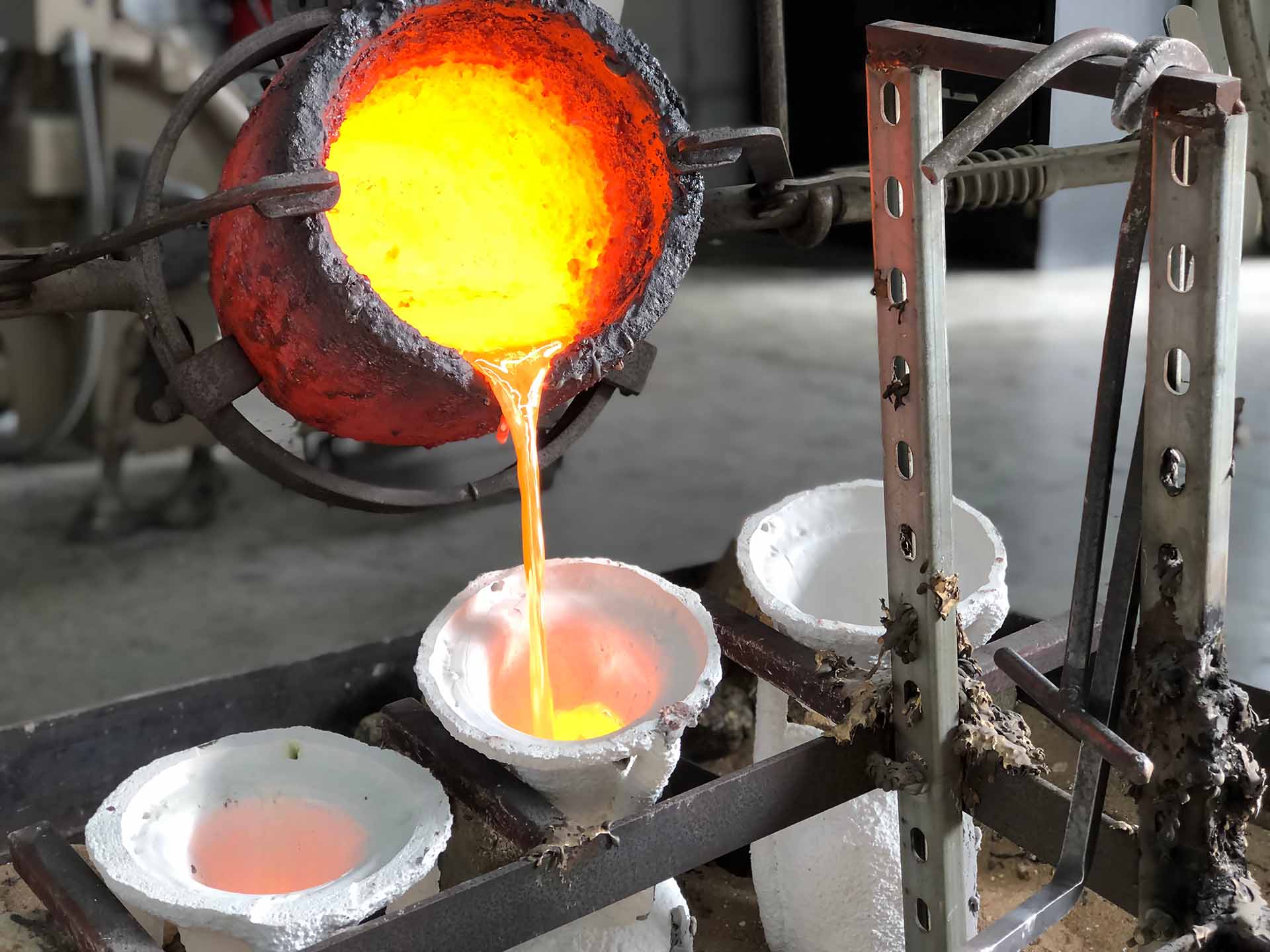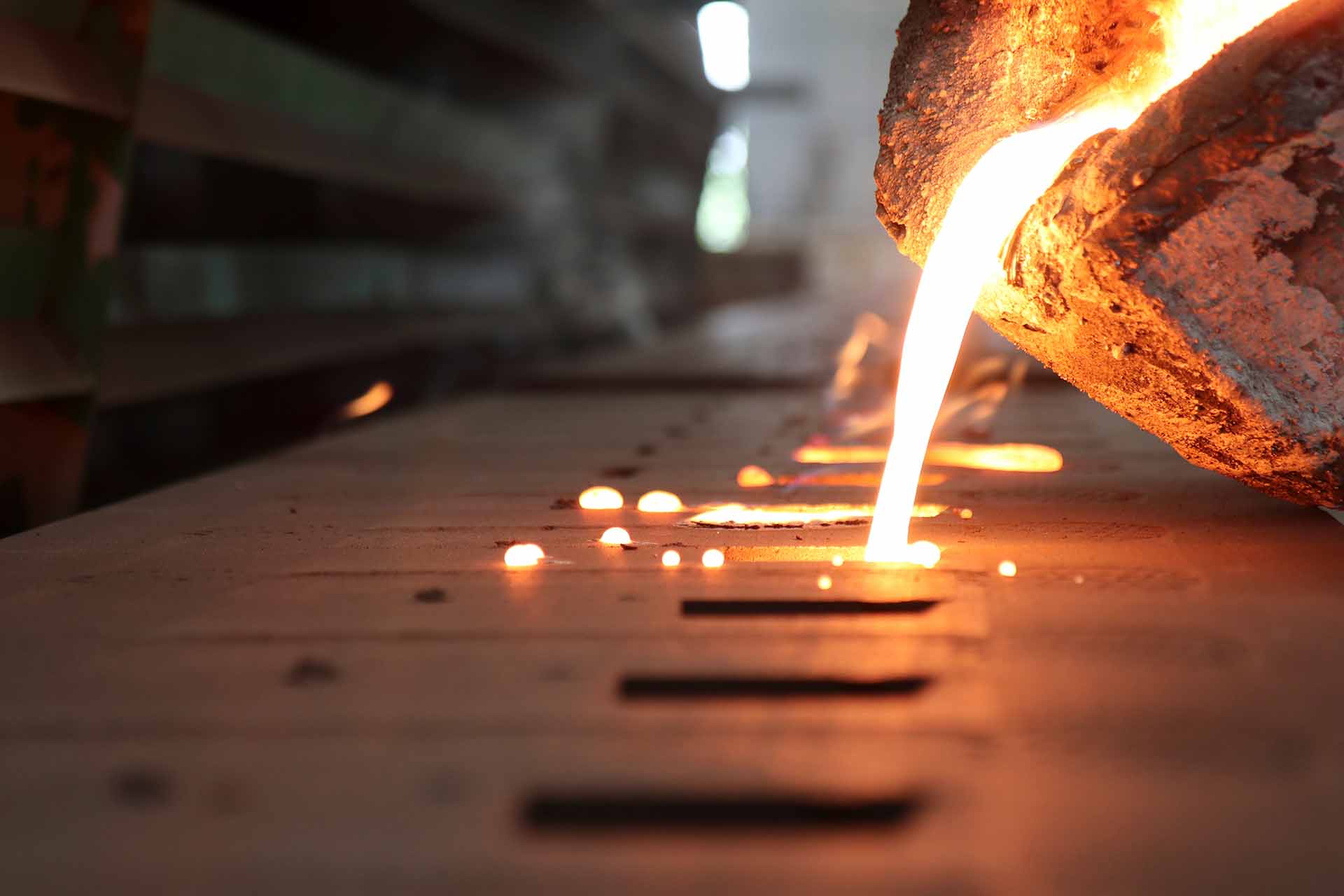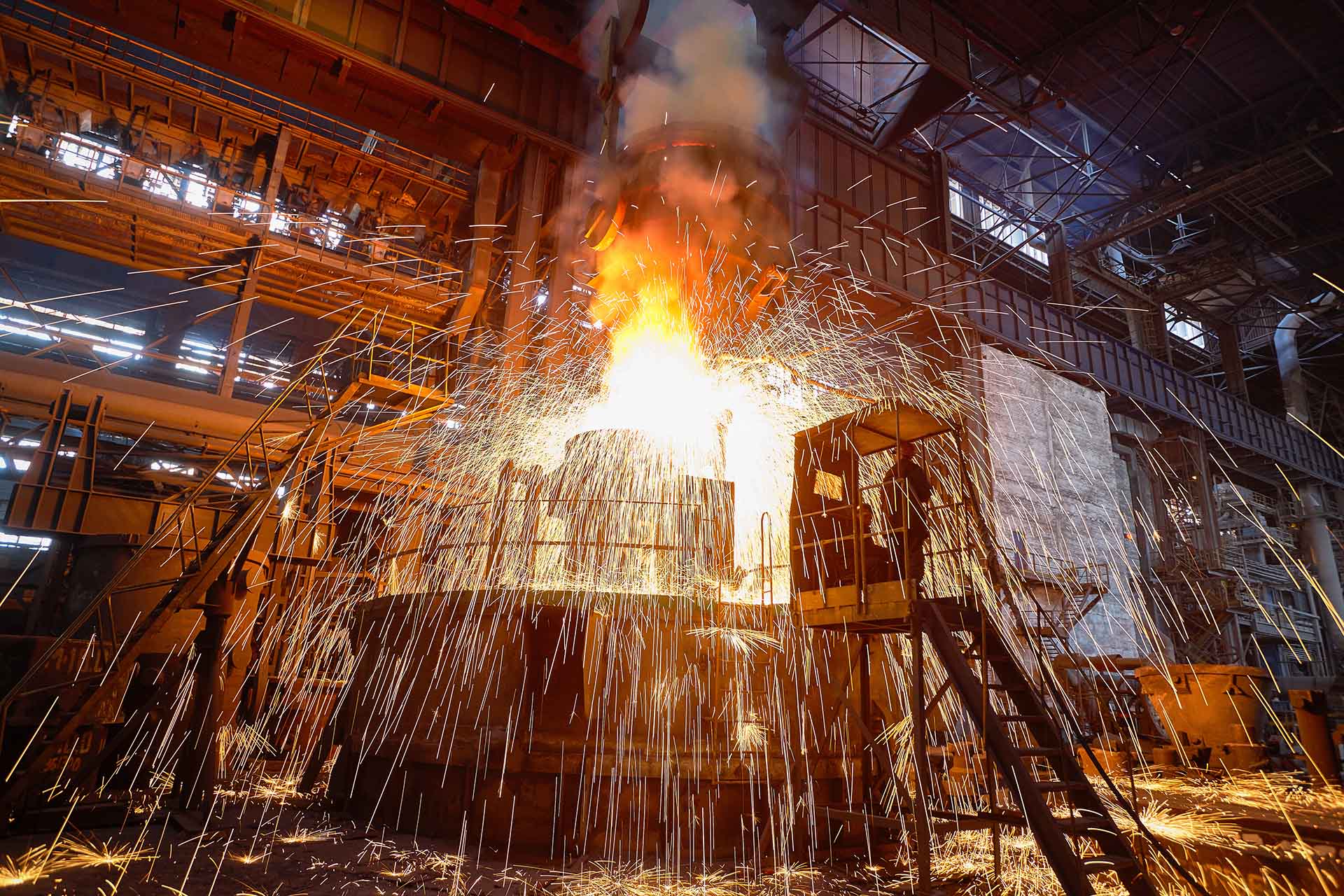Copper Casting Foundry Services
At Alabama Copper & Bronze, we take immense pride in our role as a premier provider of copper casting foundry services.
With decades of copper casting experience, we have honed our craft and expertise to become a trusted name in the industry.
Copper castings play a pivotal role in numerous industries, showcasing the exceptional versatility and utility of this timeless material. From electrical and electronics to automotive, marine, aerospace, and construction, the reach of copper casting components extends far and wide. Copper’s unrivaled electrical conductivity, corrosion resistance, and malleability make it indispensable for many applications.
Our Copper Casting Process
We employ a methodical and time-honored approach to copper alloy casting, harnessing decades of experience to ensure precision and excellence in every project.
At the heart of our process lies the art of pattern making, where intricate replicas of desired copper components are painstakingly crafted to capture even the finest details. These patterns serve as the blueprint for our sand molding process to create a perfect negative impression of your pattern.
Once the mold is prepared, we move to the casting stage, where the molten copper or molten copper alloy is poured into the sand mold, assuming the desired shape. Our dedication to precision is further demonstrated through rigorous quality control inspections at each stage, ensuring that the final product not only meets but exceeds the stringent specifications and quality standards.
Quality control measures, including meticulous inspections and adherence to precise casting parameters, are crucial in preventing defects as the molten metal cools, ensuring the integrity of the metal cast. With decades of experience under our belt, Alabama Copper & Bronze has refined its craft to deliver copper castings of exceptional quality, whether for industrial machinery, architectural elements, or artistic creations.
Copper Parts Across Industries
Electrical
Within the electrical and electronics industry, copper cast parts are integral to numerous components and systems. Copper’s exceptional electrical conductivity is harnessed in the production of connectors and terminals, facilitating efficient and reliable electrical connections. Copper castings are the foundation of switches and contactors, ensuring precise control and uninterrupted electrical contact, especially in safety-critical applications. Furthermore, they are vital in transformers and power distribution systems, where copper’s conductivity and heat dissipation properties enable the efficient conversion and transmission of electricity.
Marine
Copper cast parts find a crucial place in the demanding marine industry, where resistance to saltwater corrosion is paramount. Copper alloys are employed in marine hardware, ship propellers, and valves, with their exceptional corrosion resistance ensuring longevity and reliability even in the harshest maritime environments. Copper’s resistance to biofouling, the accumulation of marine organisms on underwater surfaces, further enhances its appeal in marine applications. From propelling vessels to maintaining critical systems, copper castings contribute significantly to maritime safety, efficiency, and durability, making them indispensable components in the shipbuilding and marine sector.
Industrial Manufacturing
Copper castings play a pivotal role in industrial machinery, providing durability and precision in the most demanding environments. Copper’s excellent wear resistance, lubricity, and thermal conductivity make it an ideal choice for parts that require reliable and efficient performance. In heavy machinery, copper castings reduce friction, minimize heat buildup, and ensure smooth operation, extending the lifespan of essential components. Whether in mining, manufacturing, construction, or any industry reliant on heavy-duty machinery, copper casted parts exemplify reliability and precision, contributing to the seamless operation of industrial processes and machinery.
Plumbing
Copper cast parts are foundational components in the plumbing industry, renowned for their unmatched combination of durability, corrosion resistance, and ease of fabrication. These castings are employed in various critical applications, including pipe fittings, valves, connectors, and fixtures. Copper’s inherent resistance to corrosion ensures that plumbing systems remain robust and dependable, even in environments with aggressive water conditions.
Art & Design
Copper holds a special place in the world of art, sculptures, and design, where craftsmanship and aesthetics merge seamlessly. Copper offers artists and designers a medium that combines the malleability of copper with the enduring quality of casting techniques. Copper’s distinctive warm hue, patination potential, and ability to capture intricate details make it an ideal choice for creating sculptures and design elements that resonate with timeless elegance. From grand public installations to intricate interior design pieces, copper casts allow artists to infuse their creations with a unique blend of creativity and craftsmanship.
Materials and Alloys in Copper Casting
While pure copper is occasionally used, copper alloys take center stage in this domain. A copper based alloy incorporates elements such as zinc, tin, aluminum, and others to create a spectrum of compositions with unique properties. Whether it’s enhancing corrosion resistance, elevating strength, or achieving specific colorations, the choice of alloy is paramount. Silicon bronze, phosphor bronze, aluminum bronze, and gunmetal are just a few examples of copper alloys tailored to specific applications. The careful selection of materials and alloys in copper casting not only ensures that each component is fit for its intended purpose but also showcases the adaptability and versatility inherent to this timeless casting technique.
We collaborate closely with our clients, drawing on our expertise to guide them in selecting the optimal copper alloy for their specific project. Through detailed discussions and careful consideration of project requirements, we ensure that the chosen alloy aligns perfectly with the desired properties, whether it’s corrosion resistance, strength, color, or other essential factors. This collaborative approach guarantees that each copper casting we create is not only a work of technical precision but also a customized solution tailored to our clients’ vision and needs.
Why Choose Alabama Copper & Bronze for Your Copper Casting Needs
Our mastery of the intricate metal casting process, along with our expertise in material selection and pattern design, ensures that the resulting copper components meet the highest standards of quality and performance.
At Alabama Copper & Bronze, we don’t just create metal copper castings; we create enduring works of art and precision engineering. Experience the difference of working with a trusted leader in the industry. Contact us today to discuss your copper casting project and witness the excellence that defines us.
Copper Casting FAQ
Copper castings present a multifaceted array of advantages, making them an indispensable choice for numerous applications. Renowned for exceptional electrical and thermal conductivity, they excel in ensuring efficient energy transfer and heat dissipation. Copper’s inherent resistance to corrosion ensures durability, reducing maintenance and replacement costs. With the ability to capture intricate details and complex shapes, copper castings thrive in artistic and decorative endeavors. Their malleability allows for versatile customization, meeting specific requirements with ease. The enduring appeal of copper, coupled with precision casting capabilities, positions copper castings as a reliable and versatile solution across industries, from electrical engineering to art and design.
Choosing the right copper alloy for a project is a pivotal decision, as it directly impacts the performance and suitability of the final component. Several key factors should be considered. First, assess the project’s requirements, such as electrical conductivity, corrosion resistance, strength, and appearance. For applications demanding high electrical conductivity, copper alloys like C10100 or C11000 are ideal. When corrosion resistance is paramount, silicon bronze (C87500) or aluminum bronze (C95400) may be preferred. Strength-critical projects often benefit from phosphor bronze (C51000) or manganese bronze (C86200). Additionally, consider the alloy’s cost and availability, as well as any regulatory compliance requirements. Collaborating with experienced experts, like those at Alabama Copper & Bronze, can prove invaluable in navigating the spectrum of copper alloys and making the most informed choice for a project’s success.
Copper castings offer a canvas for a diverse range of finishes and surface treatments. They can be polished to achieve a mirror-like shine, brushed to create a satin finish, or left untreated to develop a natural patina over time. Patination is a popular choice, allowing for the controlled development of unique colors and textures on the copper surface, enhancing both aesthetics and protection against corrosion. Alternatively, various coatings and platings can be applied, including lacquers, clear coats, or electroplated finishes like nickel or chrome, offering additional protection and customization possibilities. These finishing options empower designers and manufacturers to tailor the appearance of copper castings to suit the intended application and desired visual effect, making them versatile not only in function but also in aesthetics.
Lead times for copper casting projects can vary depending on factors such as project complexity, volume, and current workload. These lead times are typically communicated during project discussions and can range from weeks to months. At Alabama Copper & Bronze, we work closely with clients to establish realistic timelines that meet their project requirements while ensuring the highest quality standards are upheld throughout the process.
Copper casting, while a versatile and valuable manufacturing process, does have certain limitations that should be considered. Firstly, the size and weight of copper casted components can be restricted, making it less suitable for extremely large or heavy parts. The cost of copper alloys can be higher than some alternative materials, which can impact the cost-effectiveness of using copper castings for very large or mass-produced components. Additionally, certain copper castings may require post-casting machining to meet precise dimensional requirements, adding both time and cost to the project. While these limitations exist, they can often be mitigated with careful planning, expertise, and a thoughtful consideration of project requirements.
Sign Up For Our Newsletter


